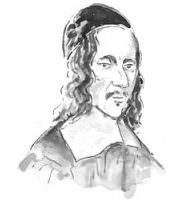by George Herbert
My God, I heard this day
That none doth build a stately habitation
But he that means to dwell therein.
What house more stately hath there been,
Or can be, than is Man? to whose creation
All things are in decay.
For Man is ev'ry thing,
And more: He is a tree, yet bears more fruit;
A beast, yet is, or should be, more;
Reason and speech we onely bring;
Parrats may thank us if they are not mute,
They go upon the score.
Man is all symmetrie,
Full of proportions, one limbe to another,
And all to all the world besides:
Each part may call the farthest, brother:
For head with foot hath private amitie,
And both with moons and tides.
Nothing hath got so farre,
But Man hath caught and kept it, as his prey.
His eyes dismount the highest starre:
He is in little all the sphere.
Herbs gladly cure our flesh, because that they
Find their acquaintance there.
For us the windes do blow;
The earth doth rest, heav'n move, and fountains flow.
Nothing we see, but means our good,
As our delight, or as our treasure;
The whole is, either our cupboard of food,
Or cabinet of pleasure.
The starres have us to bed;
Night draws the curtain, which the sunne withdraws:
Musick and light attend our head;
All things unto our flesh are kinde
In their descent and being; to our minde
In their ascent and cause.
Each thing is full of dutie:
Waters united are our navigation;
Distinguished, our habitation;
Below, our drink; above, our meat:
Both are our cleanlinesse. Hath one such beautie?
Then how are all things neat!
More servants wait on Man,
Than he'l take notice of: in ev'ry path
He treads down that which doth befriend him,
When sicknesse makes him pale and wan.
Oh mightie love! Man is one world, and hath
Another to attend him.
Since then, my God, thou hast
So brave a Palace built; O dwell in it,
That it may dwell with thee at last!
Till then, afford us so much wit;
That, as the world serves us, we may serve thee,
And both thy servants be.
Last updated January 14, 2019




